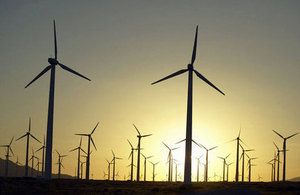Climate Diplomacy Day celebrated in Romania on 17 June 2015
'2015 – A landmark year to address climate change': Joint article by French British, and German Ambassadors to Bucharest

Wind farms
All over the world, forests have a crucial role to play in the fight against climate change, due to their role in storing carbon. Up to 15-20 per cent of global greenhouse gas emissions come from deforestation and forest degradation, according to UN studies. Up to 60% of Europe’s temperate old growth forests exist in Romania. At the same time, statistics show that three hectares of wood are cleared every hour in Romania. This concern was underlined by the participants of the first citizen consultation on climate and energy organized by the civil society in Romania, in Cluj, at the beginning of this month, within the frame of the UN Climate change conference Paris 2015.
And this is just one example. Climate change and its causes are not a myth and we can already see signs of it all over the world. Burning fossil fuels such as coal, oil and gas to cover our energy needs is increasing levels of greenhouse gases in the atmosphere. This already affects the environment, the economy and how people live. The World Meteorological Organisation reported that between 2001 and 2010 extreme weather created economic damages of 660 billion US dollars, 54% higher than in the previous decade.
Climate change is visible on our continent, in our home countries and in Romania too. As a result of the warmer climate demand for water for irrigation of crops will increase. Also, some regions will experience increasingly frequent flooding as well as a rise in heat waves, storms and winds, as well as sea-level rise. But the greatest risks to our security will be felt indirectly through increasing food prices, and food and water stress in the longer term.
As many other countries Romania was subject to massive floods in the past years, which generated tremendous damages. Statistics show that 2007 was the warmest year of the last two decades, which also experienced the most serious drought in the last half a century. A huge positive impact can be reached by acting globally against climate change. Since 1992, our home countries as well as Romania have been part of the United Nations Framework Convention on climate change (UNFCCC). Governments unanimously agreed in 2009 to aim to limit climate change to 2 degrees Celsius, but collectively we are not there yet. This year presents a huge opportunity to secure a credible and legally-binding global deal to limit global warming. In December, Paris will host one of the biggest UNFCCC summit (COP 21) to date. If we act now we can still keep global warming under 2ºC!
Members of the European Union have already a good story to tell as emissions on our continent have already decreased by 19% since 1990. And EU has agreed last year to cut domestic emissions by at least 40% by 2030 compared to 1990 levels. These targets are very ambitious and challenging for all our countries. Our solutions might be different, like increased energy efficiency, lower emissions in the energy sector or a greener transport.
But the good news is that we all can control the harmful impact of climate change. By using energy more efficiently, using low carbon energy sources and stopping deforestation climate change can be limited. And mitigating the risks of climate change through a transition to a low carbon global economy presents a huge opportunity for driving innovation and creating jobs: In Germany 80% of new energy generating capacity in the last decade came from renewables, creating a new business sector with 380,000 new jobs; in France the new law on energy transition and green growth, mobilising the entire society against climate change including businesses and local authorities, could contribute to the creation of over 100 000 jobs in 3 years; the UK has been the first country to establish a Green Investment Bank to leverage private sector investment in renewable energy. Thus, the transition to a low carbon economy is good for countries: new jobs, cleaner air, better health, lower poverty and more energy security. We should all be ready to rise to the challenge.
H.E. Mr François SAINT-PAUL, French Ambassador to Romania H.E. Mr Paul BRUMMELL, British Ambassador to Romania H.E. Mr Werner Hans LAUK, German Ambassador to Romania